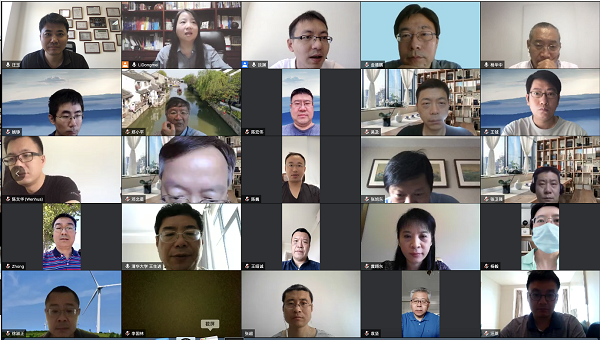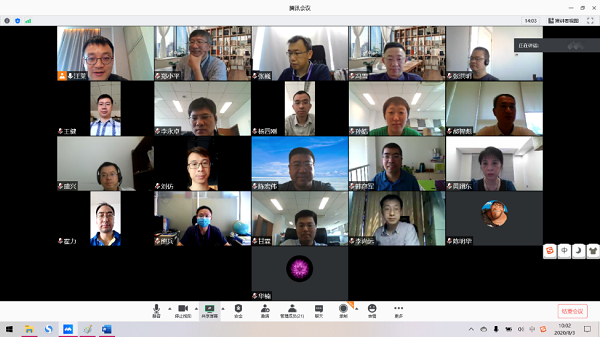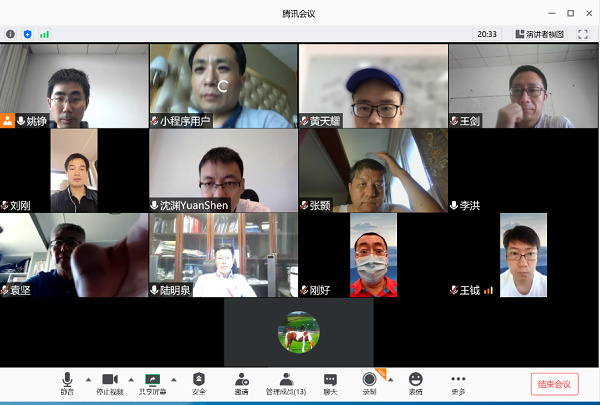On the morning of August 4, 2020, the Department of Electronic Engineering, Tsinghua University held an online exchange meeting on learning the spirit of the National Postgraduate Education Conference. Chen Wei, Director of the Degree Office, attended the conference. About 40 people including members of the Party and Government Joint Committee of the Department of Electronic Engineering, members of the Degree Subcommittee, directors and deputy directors of all institutes (center), and branch secretaries participated in the exchange. Shen Yuan, Deputy Teaching Chair of the Department, chaired the conference.


Wang Yu, Chair of the Department first delivered a speech. He emphasized that we must implement the spirit of the National Postgraduate Education Conference comprehensively and pay special attention to three aspects of work in practice: Firstly, we must adhere to the indomitable spirit and the integration of science and education, solve the bottleneck problem in response to major national needs, and do scientific research work with the international leading level; Secondly, we must adhere to crossover and openness, that is, we must intersect it with other disciplines in combination with the characteristics of electronic information discipline, adhere to the completely open and international development model, strengthen cooperation with domestic enterprises, and combine scientific research with industrial development; Thirdly, we must adhere to the introduction and cultivation of teachers and strengthen the scientific research level and teaching ability of tutors, to make them a strong support for postgraduate cultivation.
Combined with the instructions of General Secretary Xi and the current work priorities, Chen Wei, Director of the Degree Office emphasized that firstly, we must adjust the discipline layout and closely integrate national needs with the discipline layout. That the integrated circuit becomes a first-level discipline will have a far-reaching influence on discipline evaluation and resource allocation. Secondly, we must improve the level of the tutor team. In the future, corresponding policies on evaluation and employment of tutors and the consideration of tutors' "combination of ability with political integrity" will be introduced. Thirdly, we must reflect the long educational thought of the general secretary, that is, answer problems such as train people for whom, what kind of people to be cultivated and how to cultivate people. The cultivation of graduate students must be based on major national needs. Under the current international situations, the cultivation of high-level talents should be promoted to a new level, and the fact that undergraduate education reflects the background and the doctoral training reflects the height should be realized. In the future work, we should reform postgraduate cultivation, strengthen the cultivation of professional degree postgraduates, make arrangements in advance and seize opportunities in the whole process of postgraduate cultivation to achieve results.

Then, the directors of the institutes of the Department of Electronic Engineering reported the situation of the seminars on learning and conveying the conference spirit.
To comprehensively and thoroughly study and understand, and to implement the spirit of the National Postgraduate Education Conference practically and effectively according to the practical situation, the Department of Electronic Engineering arranged institutes (center) in units to convey the spirit of the National Postgraduate Education Conference to all in-service teachers and organize discussions on July 31. 6 institutes and the Experimental Teaching Center of the Department of Electronic Engineering organized learning seminars from August 1 to 3, and the coverage rate of in-service teachers exceeded 90%. The Institute of Communication and the Institution of Information Cognition & Intelligent System also invited some retired teachers to participate. In the academic discussion of all institutes (center), the members of the Degree Subcommittee of the Department conveyed the instructions of General Secretary Xi Jinping, the instructions of Premier Li Keqiang, the speech delivered by Vice Premier Sun Chunlan, the speech delivered by President Qiu Yong and the summary speech delivered by the Minister Chen Baosheng at the National Postgraduate Education Conference, as well as the speeches delivered by President Yang Bin and President Qiu Yong at the school's learning meeting. All institutes had full discussions and exchanges on the spirit of the conference. It is widely believed that the postgraduate education conference is very important and timely, has pointed out the direction for future postgraduate cultivation and relevant suggestions have been proposed based on actual conditions. Main contents are as follows:
Liu Yongpan, Director of the Institute of Circuits & Systems, introduced that the institute emphatically discussed the understanding of relationships between inter-disciplines and cross-disciplines, and how to adapt to and promote the construction of real inter-disciplines through improving the evaluation system and other mechanisms, rather than simply cross-discipline. In the meantime, he said that integrated circuits becoming a first-level discipline have a far-reaching influence. The country established the inter-discipline in hope that the bottleneck problems can be solved. The Department of Electronic Engineering should further consider how to actively plan and participate, actively carry out the external cycle while strengthening the internal cycle and carry out international exchanges to avoid blind actions.
Wang Lai, Director of the Institute of Information Optoelectronic Technology, said that the undergraduate and graduate course reforms of the Department of Electronic Engineering highly fit with the spirit of the conference and there was some urgent work that needed to be done quickly and systematically, such as reform of postgraduate cultivation and management system, and we should re-examine and improve the process from postgraduate recommendation, enrollment, training, evaluation, graduation to employment. He also expressed that we should care about outstanding students who are hindered from going abroad, inspire their academic inclination, and continue discussion in combination with the life of the party organization in the future.
Chen Wenhua, Director of the Institute of Microwave, introduced that the Institute emphatically discussed four aspects. Firstly, in course construction, we should adjust professional courses for the research fields of each institute and strengthen the consistency of undergraduate and master courses; Secondly, in scientific research, we should make a layout and determine new research directions in accordance with major national needs; Thirdly, in postgraduate cultivation, we should pay attention to psychological health problems and actively help students in difficulties; Fourthly, improve the cultivation mechanism. For example, consider retaining the places of tutors and postgraduate students in the withdrawal mechanism, update the contents of the existing student disciplinary regulations, and standardize the application for the professional degree master base of innovative entrepreneurship.
Yao Zheng, Director of the Institute of Information System, said that in the course system construction, we should add relevant basic courses for postgraduate students to meet the major national strategic needs for artificial intelligence and other professional fields. In the meantime, we should promote professional master's programs in national key fields and build a course system suitable for the professional master training to comprehensively promote the level of cultivation of professional talents. In the meantime, it is recommended to introduce a flexible postgraduate recommendation system to attract more outstanding students who are hindered from going abroad, and to further improve relevant systems of postgraduate cultivation link, so that tutors can have rules to follow.
Zhong Xiaofeng, Deputy Director of the Institute of Communication, introduced that we should strengthen the cultivation of relevant professional talents in key field of electronic information, resume engineering master's classes, closely integrate the training of professional masters with industrial circles, and the university and enterprises should jointly discuss master's topics selected and evaluation indicators, so that students not only can reach the training level but also can make real contributions to the industrial circles. Reduce the accommodation stress through the model of cultivation base and accelerate the construction of curriculum system for masters to make the courses of the two disciplines more balanced.
Wang Shengjin, Director of the Institution of Information Cognition & Intelligent System, introduced that the Institute raised some current problems in the postgraduate cultivation at the seminar: Some students lacked the ambition and pursuit of scientific research, and had a mentality to cope with graduation; How to measure the level of postgraduate students without setting requirements for publication of papers; There were serious deficiencies in the number of postgraduate students of the engineering departments and a shortage of places in teachers and doctoral students in research, etc. To solve these problems, the suggestions of the teachers in the institute were also summarized, such as strengthening the connection between courses and scientific research, and setting up relevant postgraduate core courses; Study topics selected, aim at international cutting-edge topics and develop new ideas; Increase the examination of the actual system before the defense; Increase the display of students' outstanding achievements and off-campus blind review experts; Strengthen support for the evaluation and employment of research series titles.
Ma Xiaohong, Director of the Experimental Teaching Center, introduced that the Experimental Center would also provide appropriate resources for postgraduate education such as course system reform and experimental platform opening, and set up experimental elective courses for postgraduate students while continuing to consolidate experimental teaching for undergraduate students. For example, the 5G communication experimental platform now under construction is developed in cooperation with the teachers of the Institute of Communications, and a teaching model combining industry-university-research cooperation will be formed in the future. The Experimental Center also proposed to resume the "electronic measurement" experiment course for postgraduate students, and said that it would insist on providing an open platform for scientific research in the department.
Chen Wei specifically answered teachers' concerns that changes in the requirements for postgraduate students' innovation achievements may increase the pressure on tutors. He said that the establishment of tutor groups is encouraged in the school's current cultivation regulations to avoid the excessive pressure on tutors. Shen Yuan added that the revised way of asserting innovation achievements isn't to discourage postgraduate students to publish papers, but to no longer use the number of papers as a precondition for degree application. In the current postgraduate cultivation program of the Department of Electronic Engineering, there are many links, in which certain evaluation and feedback on the phased achievements of postgraduate students are given.
Teachers also made active speeches in the free discussion link.
Zhang Xudong, Chairman of the Teaching Committee of the Department, said that the National Postgraduate Education Conference would promote the postgraduate cultivation to a very high and important position. The Department of Electronic Engineering has done a lot of work in postgraduate cultivation in recent years, and the conference has pointed out the direction for the next improvement. For example, the previous course system was mainly for the master of engineering. The cultivation of professional masters requires the design and adjustment of the course system for professional degree projects. We strive to build a group of targeted high-quality professional master's course groups to support the education of professional masters.
Li Guolin, Deputy Director of the Institute of Circuits & Systems, believed that a system that can stimulate the vitality of young teachers needed to be developed in the postgraduate cultivation and the support to young teachers and their academic vitality should be increased. To solve this problem, Wang Yu, Chair of the Department, complemented the relevant policies of the department. The newly established "Chuanxin Scholar Foundation" by the Department of Electronic Engineering specifically supports newly introduced young teachers. In addition, the independent scientific research in the department provides young teachers with long-term support through the initiation selection mechanism.
Yang Huazhong, Chairman of the Degree Subcommittee, said in his speech that President Qiu mentioned that the reform of the national key lab should be based on the national major needs, implemented in an organized manner, and considered beyond the department and disciplines. The Department of Electronic Engineering has always emphasized that it should do the very important things. Combination of the concept with the major national needs is a choice we must make today. For the newly created first-level discipline integrated circuits, Mr. Yang emphasized that electronic information technology has played an important role in many fields. The Department of Electronic Engineering needs to consider how to promote a simple cross-discipline to an inter-discipline, find problems in practical applications, and find problems that can't be solved in a single discipline, solve these problems through multidisciplinary cooperation, and form a new inter-discipline. Mr. Yang also pointed out that for the cultivation of high-level talents, a system suitable for high-level innovative talents should be first formed, and the Degree Subcommittee should improve the relevant system for graduate education and cultivation, and gradually form a cultural atmosphere in which the innovation is encouraged.
Huang Yidong, Former Chair of the Department believed that the conference reflects the emphasis on postgraduate education as a nation, and highly fits with the overall development planning of the Department of Electronic Engineering. The current focus that the Department of Electronic Engineering develops is scientific research. Graduate students are the main force of scientific research. Starting from graduate education is an important handgrip. In combination with President Qiu's speech, Mr. Huang made a few suggestions on postgraduate cultivation in the department: Firstly, the Department of Electronic Engineering has done layout on the postgraduate course system and the construction of the undergraduate and postgraduate connection courses, and the further demonstration should be conducted in the next step taking the institute as a unit; Secondly, the TopEE and dual degree master program with JHU that have been initiated in the department have laid a good foundation for international cooperation, and further improvement of the mechanism of cooperation with first-class universities will help improve the level of postgraduate cultivation. Thirdly, the professional master training in the department can continue to be carried out on the existing basis. Combined with the needs of domestic industries, the professional master training will be the hub of the school and the industrial circles. Fourthly, we need to strengthen the management of the cultivation of doctoral students and improve the cultivation quality of doctoral students through improving the cultivation process system and elimination mechanism. Finally, Mr. Huang also mentioned that the Department of Electronic Engineering must be ready to respond to the adjustment of all policies in the next step, maintain its own advantages, and actively gain the initiative to offer advice and suggestions for the university.
Liu Yimin, Deputy Secretary responsible for student work, introduced the reform measures of the second classroom in postgraduate cultivation. Strengthen the cooperation with the alumni in establishing practice bases and provide students with better conditions for innovation and entrepreneurship and employment practice in combination with resources within and outside the department. Give full play to the role of the second classroom and give back to the first classroom in talent cultivation and interdisciplinary construction.
Finally, Jin Depeng, Party Committee Secretary of the Department made a concluding speechmade some closing remarks. He believed that the cultivation of high-level talents is particularly important and critical under the current international and domestic situation and the postgraduate education reform has profound significance. The department would pay high attention and perform the proper work. Mr. Jin introduced the focus on the next steps of the Department of Electronic Engineering. Firstly, optimize the scientific research system. On the one hand, we need to adhere to basic research and effectively combine the research topics of graduate students with the frontiers of international disciplines and also need to develop organized scientific research in accordance with major national needs and combine the postgraduate cultivation with major national needs and the bottleneck project. Secondly, improve the cultivation quality and form a complete postgraduate cultivation system. Mr. Jin specifically pointed out that electronic information technology is one of the directions that is emphasized in the conference and the state needs to prioritize, but the number of graduate students in the Department of Electronic Engineering is far from meeting the needs for high-level talents in electronic information technology. We strive for a moderate expansion of the admission scale of graduate students through various channels, to convey more talents for solving the major national needs and the problems in the bottleneck project, and meanwhile strengthen all links of cultivation by improving the system construction to effectively improve the cultivation quality. Thirdly, strengthen guidance learning ideology and politics. Tutors should care about students' job orientation, be responsible for ideological education to students, and guide more students to key enterprises and important posts to contribute to the social development of a country. Jin Depeng also required teachers to continue to deeply comprehend the spirit of relevant conferences, sorted out and summarized the problems in the postgraduate cultivation in the Department of Electronic Engineering and offered advice and suggestions in combination of the major national needs and the school's policies, make suggestions, and actively participate in all measures for the postgraduate education reform in the Department of Electronic Engineering at next stage and contribute to improving the quality of postgraduate education in the Department of Electronic Engineering.

Screenshot of the learning seminar of the Institute of Information Optoelectronic Technology

Screenshot of the learning seminar of the Institute of Information System